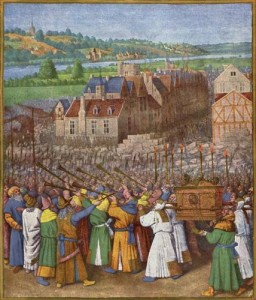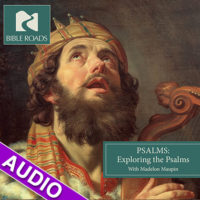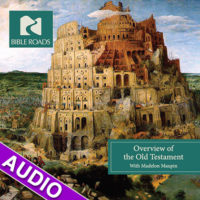A deeper study of the Psalms is helping me understand why this ancient poetry has continued to be treasured and how they apply to the most challenging contemporary struggles. This came to thought when the Charlie Hebdo killings occurred and the West responded with increasing concern about the jihadist form of Islam. Could the Psalms provide answers for how to pray about such a 21st century Nationalism dilemma?
I found my answer in Psalm 9 and 10, long thought to be a single prayer divided into two parts. (In the Septuagint, the Greek translation of the Hebrew Scriptures in the late 2nd century BCE, they are a single Psalm.) Reading them together illustrates the same spiritual traverse we make when–on the one hand– we’re grateful for God’s allness and power (Ps. 9). But on the other hand, the present situation is dire and one is tempted to think the wicked ‘nations’ (jihadist form of Islam) appear to be winning.
Who hasn’t felt this contradiction? So whoever wrote this Psalm (many are composed by King David but by no means all) provides a roadmap for how to navigate this oldest of dilemmas: faith mixed with a harsh present situation that seems to undermine such faith.
Psalms 9 and 10 is a page out of Israel’s ancient playbook. For centuries the Hebrews encountered ‘wicked nations’ and wrestled with God’s role in their apparent strength and sometimes victories. These Psalms reveal how Israel worked through such challenges from a spiritual vantage point.
First, the author personifies the congregation as a single individual, assigning them the role of the ‘lowly’ (in Hebrew ‘ani, translated as poor, oppressed or orphaned). The opposing wicked enemy is assigned the role of ‘the nations’. These two characters exemplify both the oppressed individual and the menacing nation.
Appropriately, the Lord (God) is cast as the king whose job is to protect the most vulnerable of his kingdom (orphans, poor and lowly) through fair judgments. This would include stopping and disciplining those who would exploit the poor. This is what we hope for in contemporary courts—that the “Goliath’s” are finally stopped in their stampede of the “David’s”.
The poet begins Psalm 9 with a prayer of Thanksgiving for all that the Lord (the term the Hebrew Scriptures often use for God) has already done for His children. What a prayer-map for where our appeals can begin, regardless of how difficult the situation currently faced. Beginning prayer by remembering the Lord’s goodness helps desperate feelings of hopelessness give way to hope.
In contrast, Psalm 10 opens with the individual voice lamenting what we’ve probably all pondered: ‘where is God when I need Him? He feels very absent!’ Or, as the NRSV translation declares:
Why, O Lord, do you stand far off?
Why do you hide yourself in times of trouble? (Ps. 10:1,2)
And as The Message captures in contemporary frustration:
God, are you avoiding me?
Where are you when I need you? (Ps. 10: 1, 2)
The verses continue by describing the national self-interest that Israel’s enemies display, as well as a lack of self-awareness born from the frailty of the human (‘enosh in Hebrew). The Hebrew people recognize these dangerous traits all too well, having been warned of their own indulgence in them by Israel’s prophets in earlier years.
Finally in Ps 10:12 is the great cry: “Arise, O Lord”(NLT). How clearly Israel’s congregation would have recognized the phrase as the battle cry of its earlier years when conquering Canaan. It was the cry addressed to the Ark of the Covenant when wheeled out to lead the army in battle against its enemies.
Today we can follow ancient Israel’s example and cry out ‘Arise, O Lord’ not against a people but an ideology of aggression and force that works to destroy anything other than its own convictions. ‘Arise’ to the power and might and mercy of the Lord – yesterday, today and forever.





I have found the Psalms really speak to the human situation of all kinds – some times up sometimes down. I find them very comforting. Thanks for your commentary.
Ah, another topic for Wednesday readings! In reading Psalms 9 & 10 in the Common English Bible which I use on most Wednesdays, I found some perfect examples of what’s going on in the Middle East: Psalms 10: 7 “They lie in ambush in secret places, like a lion in its lair. They lie in ambush so they can seize those who suffer! They seize the poor allright, dragging them off in their nets.” and so on. And the last couple of verses are: (17, 18) “Lord, you listen to the desires of those who suffer. You steady their hearts,… Read more »
Madelon, thank you for your comments on A Prayer to Heal Vicious Nationalism.
It is very helpful to have thought pointed in the right direction. Even when I know basically how to pray for such situations, it is so helpful to see how it may be put into words.